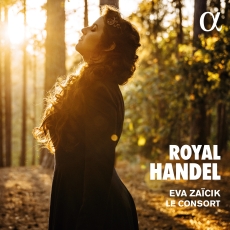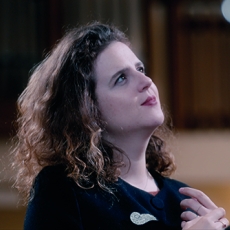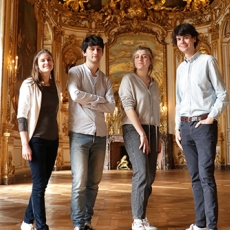Eva Zaïcik & Le Consort - Royal Handel - American Record Guide
The Royal Academy of Music functioned with Georg Frideric Handel as music director along with his associates, Giovanni Bononcini and Attilio Ariosto, for less than a decade (1719-28) but set a model for Italian opera in England. Many of the arias on this collection were first sung by Margherita Durastanti, whom Handel had known since his time in Rome. Most of these selections are not the prima donna arias, but it is clear that even secondary characters were given strong musical attention. The one problem with this recording is that it is chamber opera; that is, the arias are accompanied only by soloists. For example, `Ah! Tu non sai’ from Ottone sounds a bit thin with only a pair of violins, solo cello, and no realization of the continuo except in the middle section. Even the first edition of the music published by Handel included continuo figuration in all of this aria. This same type of performance is found in `Ombra cara’ from Radamisto which occasionally even transposes phrases in the continuo up an octave, further lightening the texture, and without using even the double bass in the continuo—which instrument is also omitted in the midddle section of `Agitato da fiere tempeste’ from Riccardo Primo. Since this was recorded in June 2020, there may have been restrictions in how many musicians could be in the church. The saving grace and real value of this release is how effective Eva Zaicik is in this repertoire. Her voice has the agility for the most extravagant coloratura, her diction is clear, and she has the vocal support for even the longest Handelian lyrical lines. I was also particularly impressed by the quality of her ornamentation; it is very inventive and effective, especially in `Agitato da fiere tempeste’. Perhaps she was helped by not having to sing over an orchestra, but she should soon be cast in full productions of these operas. Another pleasant surprise on this release is two arias from Caio Marzio Coriolano by Attilio Ariosti (1666-1729), premiered by the Royal Academy of Music in 1723: `E’ pur il gran piacer’ and `Sagri numi’, though in this aria the instrumentalists do not even follow the dynamic contrasts indicated in the 18th Century edition. As a model of Handelian singing, this recording can be recommended, and there are full texts and translations. But Handel, Ariosti, and Bononcini deserve an orchestra.


